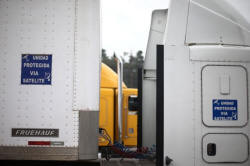Mexican truckers travel in fear as highway robberies
bleed economy
 Send a link to a friend
Send a link to a friend
 [May 22, 2018]
By Noe Torres and Lizbeth Diaz [May 22, 2018]
By Noe Torres and Lizbeth Diaz
PUEBLA, Mexico (Reuters) - Glancing
constantly at his rear view mirror, truck driver "El Flaco" journeys the
highways of Mexico haunted by the memory of when he was kidnapped with
his security detail by bandits disguised as police officers two years
ago.
Back then, El Flaco, who spoke on condition of anonymity for fear of
reprisals, was beaten, blindfolded and taken to a house near Mexico City
where his captors threatened to kill him. Three days later he managed to
escape and flee.
Today he travels with a machete and a satellite tracking device in his
cab that can pinpoint him in emergencies.
Truckers covering Mexico's vast territory often move in convoys to
reduce the risk of robberies, which in 2017 almost doubled to nearly
3,000. Some drive with armed escorts traveling alongside them. Others
remove the logos from their trucks.

Companies like brewer Grupo Modelo, a unit of AB InBev, and the Mexican
subsidiary of South Korea's LG Electronics have stepped up efforts to
protect their drivers, deploying sophisticated geo-location technology
and increasing communication with authorities.
The problem is part of a wider Latin American scourge of highway robbery
that acts as a further drag on a region long held back by sub-par
infrastructure.
"Roads are getting more and more dangerous, you try not to stop," the
50-year-old El Flaco said, as he drove in the central state of Puebla,
the epicenter of highway freight theft.
"Since I was kidnapped, I've gotten into the habit of looking in the
mirror, checking car number plates, looking at who's gone past me," he
added. "I look at everything."
On the most dangerous roads, like those connecting Mexico City with
major ports on the Gulf of Mexico and the Pacific, it is almost certain
that one in every two truckers will be held up, a study by U.S.-based
security firm Sensitech showed.
While no official data on losses exist, insurers paid out almost $100
million in 2016 to crime-hit cargo operators, up 4.5 percent on 2015,
Mexican insurance association AMIS says.
The true sum is likely far higher: only one in three loads is insured
due to the cost, according to industry estimates.
More than 80 percent of goods are transported by road and rail in
Mexico, and the thefts are hurting competitiveness at a time the country
is seeking to diversify trade and tap new sources of business.
Fuels, food and beverages, building materials, chemicals, electronic
goods, auto parts and clothing are all top targets, Sensitech said.
[to top of second column] |

Signs that read "Protected via satellite" are pictured on the side
of a trailer on the Mexico-Puebla highway, on the outskirts of
Mexico City, Mexico, March 8, 2018. REUTERS/Edgard Garrido

COMPETITION SQUEEZE
Upon taking office in December 2012, President Enrique Pena Nieto promised to
get a grip on gang violence and lawlessness. But after some initial progress,
the situation deteriorated and murders hit their highest level on record last
year.
Highway robberies of trucks fell through 2014. But they almost doubled in 2015
to 985, hit 1,587 in 2016 and reached 2,944 last year.
The government has responded by stepping up police patrols in affected areas and
lengthening prison sentences for freight robbery to 15 years.
But robberies are still rising and most are not even reported due to the arduous
bureaucratic process involved, Sensitech says.
"It's hurting productivity and competitiveness," said Leonardo Gomez, who heads
a transportation national industry body.
Some drivers are armoring cabs in trucks made by companies like U.S. firm
Kenworth, an expensive move that still only covers a tiny fraction of the almost
11 million trucks crisscrossing Latin America's second-largest economy.
Last year, 53 trucks were armored against high-caliber weapons, up 40 percent
from 2016, according to the Mexican Association of Automotive Armorers.
Attacks are not confined to roads. Some 1,752 robberies were recorded on
railways last year, official data show.

Criminals have also become more sophisticated.
They are turning to high-caliber weapons and employ devices to block Global
Positioning Systems (GPS) to prevent trucks communicating their whereabouts,
experts say.
Previously, companies that suffered robberies were generally able to recover
their vehicles. Not any more.
"It's not just the goods they want, it's the trucks too," said Carlos Jimenez of
Mexican insurance association AMIS.
(Reporting by Noe Torres and Lizbeth Diaz, Writing by Dave Graham, Editing by
Christian Plumb and Rosalba O'Brien)
[© 2018 Thomson Reuters. All rights
reserved.] Copyright 2018 Reuters. All rights reserved. This material may not be published,
broadcast, rewritten or redistributed.
Thompson Reuters is solely responsible for this content. |